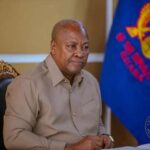The Integrated Social Development Centre, (ISODEC) a leading Policy, Research and Advocacy Organization in the country has advised the government of Ghana to develop and implement traceable structures that track gold from extraction to final sale.
ISODEC believes that such traceable systems would help reduce Illicit Financial Flows(IFFs) from the Mining sector, increase domestic revenue mobilization and boost Ghana’s quest for development and economic transformation.
The Organisation also suggested to the government to consider making the Bank of Ghana the sole buyer and exporter of Ghana’s Gold.
“Government should empower the central bank as the sole buyer and exporter of Ghana’s gold so that this can be used to shore up and stabilise our local currency, the Cedi”
The above recommendations were made in a draft research report Commissioned by ISODEC with support from the Global Financial Integrity ( GFI) and NORD. The study was conducted in three Mining zones in Ghana including Talensi in the Upper East Region, Kenyasi in the Ahafo Region and Obuasi in the Ashanti Region.
The research was meant to interrogate the supply chain challenges in the mining sector in Ghana that adversely affect domestic resource mobilization for national development.
At a well-attended meeting in Accra to validate the draft report ,Dr Bishop Akolgo , a consultant said the research found that Ghana is facing declining gold yields from existing ore bodies and an increasing cost of mining in harder-to-reach areas, especially in the Obuasi and Ahafo mines, while Artisanal gold mining, popularly called “galamsay” has become lucrative in Ghana and currently contributes about 34% of total production/output, even though producers and buyers on the ground in the mining areas think they produce more than double this figure.

Mr. Sam Salifu Danse( in Blue), Dr Bishop Akolgo (standing (R), in a conversation with some participants
According to Dr Akolgo, more Gold is exported from Ghana than the official records show and this has been confirmed by both small-scale producers and buyers on the ground.
He stated that the prices currently being paid for gold reveals that, “it is not just for profit in the transaction chain but may be used for other forms like store of value and money laundering activities, including trade-based money laundering.”
He added, “Our analysis of gold exports for the period 2020 to 2022 using both open market prices and Interquartile Range shows that there are significant discrepancies between the declared values compared to the London Bullion Market Association daily average prices. A second analysis of gold exports for same period using the Interquartile rage method also reveals that there are significant gaps between the declared values and the proxy arm’s length price, suggesting that these are suspicious transactions requiring further investigations.”
Welcoming participants to the validation workshop, Mr Sam Salifu Danse, Executive Director of ISODEC mentioned that the gold mining industry is a critical component of Ghana’s economy, contributing significantly to government revenues, merchandise exports ($7.1bn in 2023), and employment. However, there are ongoing concerns about whether the country is maximizing the potential benefits from this important natural resource.
Mr Danse explained that the research sought to shed light on the dynamics of domestic resource mobilization in the gold mining sector and identify opportunities for improving revenue generation and allocation.
“We are here to present the preliminary findings and provide a platform for further dialogue, debate, and validation of the research outcomes. Your presence here today is a testament to your commitment to enhancing the governance and transparency of Ghana’s gold mining sector.
The workshop brought together representatives from Ghana Revenue Authority,(GRA) the Ghana Chamber of Mine,Ghana Extractive Industries Initiatives( GHEITI) small scale Miners, Community Members civil society organizations, community Members, the media and other relevant stakeholders.”

Mr. Maxwell Kpebesaan Kuu-ire
Mr. Maxwell Kpebesaan Kuu-ire, Policy Analyst at GFI, West Africa acknowledged that gold mining sector is a cornerstone of Ghana’s economy, contributing significantly to about 95% of the country’s mineral revenues and providing livelihoods for many. However, it is also a sector fraught with IFF vulnerabilities.
Mr Kuu-ire noted that Illicit Financial Flows, which involve the illegal transfer of funds across borders, present a significant challenge to Ghana’s development.
“These illicit activities can take various forms in the gold mining sector, including underreporting production, smuggling, trade mis-invoicing, and tax evasion. These practices deplete our national wealth and erode the trust and integrity of our financial and governance systems, he added
The workshop, according to him, was is a critical step in the fight against IFFs, adding, “We aim to systematically identify and map the risks of IFFs within the gold mining value chain. By doing so, we can develop targeted strategies to mitigate these risks and enhance our capacity to mobilize domestic revenue effectively.”
Participants from the zones commended ISODEC and its partners for the comprehensive research, emphasizing that the study was a true reflection of what was happening in the Mining-affected communities.
By: Mohammed Suleman/ Publicagenda.news













